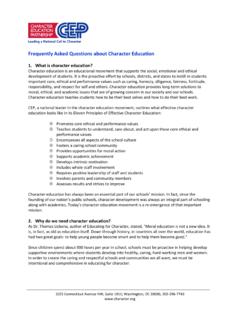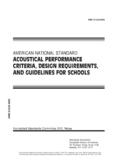Transcription of Performance Values: Why They Matter and What …
1 Character Education Partnership April 2008 1 Executive Summary:This position paper sets forth an expanded view of character and character education that recognizes the importance of Performance character (needed for best work) as well as moral character (needed for ethical behavior). While core ethical values remain foundational in a life of character, character education must also develop students Performance values such as effort, diligence, and perseverance in order to promote academic learning, foster an ethic of excellence, and develop the skills needed to act upon ethical values. The paper reviews research on the complementary contributions of Performance character and moral character to human development and achievement and describes ten practices that teachers and schools have used to develop Performance character. In this expanded vision of character education, a school or community of character is one that helps us be our best and do our best in all areas of our Position Paper of the Character Education Partnership (CEP) Performance Values: Why They Matter and What Schools Can Do to Foster Their Development12 Performance Values: Why They Matter and What Schools Can Do to Foster Their Developments they come of age in a new century, our children face great and growing challenges.
2 On a global scale, they confront an increasingly interdependent economy, exploding technological change, an environment at risk, and a world still plagued by war, disease, and injustice. In a workplace that offers diminishing job security, their ability to interact well with others and adapt to change will Matter more than technical And in their personal lives, young people face the challenge of building healthy relationships and a life of noble purpose in a culture that is often unsupportive of the highest values of the human spirit. Schools, charged with preparing students to meet these formidable challenges, face a related yet more immediate set of challenges:Maintaining a safe and supportive learning environmentAchieving adequate yearly progress on external academic standardsReducing drop-outs (30% nationally, as high as 50% in some urban areas)Improving students Performance on international testsHelping all students achieve and work to their potential, not just attain better grades or higher test kind of character will young people need to meet the challenges they face in school and beyond and how can schools help them develop it while meeting their own set of challenges?
3 The Role of Work in a Life of Character The most important human endeavor, Albert Einstein wrote, is striving for morality. We are defined by our core ethical values our integrity, our sense of justice and compassion, and the degree to which we respect the dignity and worth of every member of the human family, especially the most vulnerable among us. Research studies conducted in different cultures around the world have substantiated the universality of core ethical We are also known to others by the quality of our work. The quality of the work we do is influenced by many factors, including our skills, the presence or absence of a supportive human environment, and Performance values such as diligence, preparation for the task at hand, and commitment to the best of which we are capable. The importance of work in people s lives, and even what is regarded as work, may vary among individuals and cultures.
4 Yet in broad terms, our work is one of the most basic ways we affect the quality of other people s lives. When we do our work well whether teaching a lesson, repairing a car, caring for the sick, or parenting a child someone typically benefits. When we do our work poorly, someone usually suffers. The essayist Lance Morrow notes the centrality of work to the human community: All life must be worked at, protected, planted, replanted, fashioned, cooked for, coaxed, diapered, formed, sustained. Work is the way we tend the world. Where do we learn to care about the quality of our work and to develop the skills to do it well? To a large extent, in school . In his book, An Ethic of Excellence: Building a Culture of Craftsmanship with Students, Ron Berger says that during his nearly 30 years as a public school teacher, he also worked part-time as a carpenter. In carpentry, he writes, there is no higher compliment than this: That person is a craftsman.
5 That one word connotes someone who has integrity, knowledge, dedication, and pride in work someone who thinks carefully and does things well. 4 Berger continues: I want a classroom full of craftsmen. I want students whose work is strong and accurate and beautiful. In my classroom, I have students who come from homes full of books and students whose families own almost no books at all. I have students whose lives are generally easy and students with physical disabilities and health or family problems that make life a struggle. I want them all to be craftsmen. Some may take a little longer; some may need to use extra strategies and resources. In the end, they need to be proud of their work, and their work needs to be worthy of pride. All of us who teach would like our students to be craftsmen to think carefully about their work, take pride in it, and produce work that is worthy of pride.
6 Teachers, however, say they often struggle to motivate students to care about the quality of their work. ACharacter Education Partnership April 2008 3 Students who don t develop an orientation toward doing their best work in school may carry that over later in life. As educators, we recognize that some students path toward self-discovery, motivation, and accomplishment may emerge outside of the regular classroom in such venues as the fine arts, vocational arts and sciences, and athletics. By work, we mean all these forms of endeavor that engage a person in effortful and meaningful accomplishment. Expanding Our View of CharacterAs character educators, how can we foster students capacity to work and commitment to doing their work well, in school and throughout life? First, we must expand our view of character to recognize this important dimension of human development. Human maturity includes the capacity to love and the capacity to work.
7 Character strengths such as empathy, fairness, trustworthiness, generosity, and compassion are aspects of our capacity to love. These qualities make up what we could speak of as moral character ; they enable us to be our best ethical selves in relationships and in our roles as citizens. Character strengths such as effort, initiative, diligence, self-discipline, and perseverance constitute our capacity to work. These qualities make up what we could speak of as Performance character ; they enable us to achieve, given a supportive environment, our highest potential in any Performance context (the classroom, the athletic arena, the workplace, etc.). By differentiating moral character and Performance character, we do not intend to reify them as separate psychological entities; indeed, some persons may find it more conceptually helpful to think of these as being two aspects of our character rather than two distinct parts of character.
8 The moral and Performance aspects of character are mutually supportive. The moral aspects, besides enabling us to treat each other with fairness, respect, and care, ensure that we pursue our Performance goals in ethical rather than unethical ways. We don t lie, cheat, steal, or exploit other people in order to succeed; rather, our Performance efforts contribute positively to the lives of others. The Performance aspects of our character, in turn, enable us to act on our moral values and make a positive difference in the world. We take initiative to right a wrong or be of service to others; we persevere to overcome problems and mend relationships; we work selflessly on behalf of others or for a noble cause, often without recognition or reward. In all realms of life, good intentions aren t enough; being our best requires moral and Performance character are necessary to achieve the goals for which all schools of character strive.
9 Moral character plays a central role in helping schools create safe and caring environments, prevent peer cruelty, decrease discipline problems, reduce cheating, foster social and emotional skills, develop ethical thinking, and produce public-spirited democratic citizens. Performance character plays a central role in helping schools improve all students academic achievement, promote an ethic of excellence, reduce drop-outs, prepare a competent and responsible workforce, and equip young persons with the skills they will need to lead productive, fulfilling lives and contribute to the common good. Both the moral and Performance aspects of character are, of course, needed for all of the above pursuits; for example, we must work hard (an aspect of Performance character), in order to create and sustain a caring school environment, just as we must build caring relationships (an aspect of moral character) in order to be effective at helping students learn and Research ShowsVarious studies show the contribution of Performance character to human development and achievement.
10 Stanford psychologist Walter Mischel and colleagues conducted a study, popularly known as the marshmallow test, that assessed the ability of 4-year-olds to delay gratification (an important aspect of Performance character) and then assessed the cognitive and self-regulatory competencies of these same subjects when they were seniors in high school . The 4-year-olds were each given a marshmallow and a choice: If they ate the marshmallow when the experimenter left the room to run an errand, that was the only marshmallow they got; but if they waited 15 minutes for the experimenter to return, they received a second marshmallow. (Psychologists note that whether a child sees delaying gratification as an appropriate response in a particular situation may be influenced by family, neighborhood, and cultural )4 Performance Values: Why They Matter and What Schools Can Do to Foster Their DevelopmentThose who, at age four, had been waiters on the marshmallow test, compared to those who did not delay gratification, were subsequently better able as adolescents to make and follow through on plans; more likely to persevere in the face of difficulty; more self-reliant and dependable; better able to cope with stress; better able to concentrate on a task.







